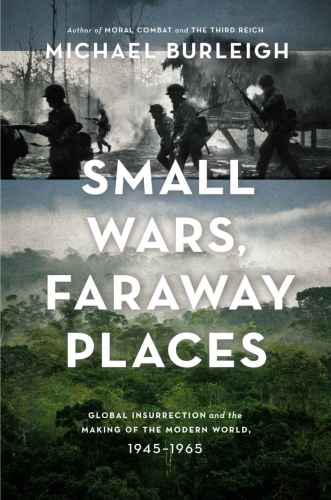
Small Wars, Faraway Places
Global Insurrection and the Making of the Modern World, 1945-1965
کتاب های مرتبط
- اطلاعات
- نقد و بررسی
- دیدگاه کاربران
نقد و بررسی

Starred review from July 1, 2013
Following the end of WWII, colonial empires collapsed, the Soviet Union and the U.S. dug in for the Cold War, and “hot” conflicts erupted across the globe. In this intriguing history, Burleigh (The Third Reich) surveys these forgotten wars and the people that fought them, ranging in his tale from Southeast Asia to the Middle East, Africa, and the Caribbean. He strikes a good balance between profiling those at the top, such as Winston Churchill (whose decision to remain prime minister in 1953 after suffering a major stroke Burleigh characterizes as “the final, desperate act of a wholly self-centered life”), and those on the ground, like Irene Lee, a Chinese detective who helped destroy the Malayan communist intelligence network after communists killed her husband. Burleigh is hard-hitting in his take on the consequences of the vacuum left behind in the wake of departing colonial powers, especially in his depiction of the Viet Minh’s decisive victory over the French at Dien Bien Phu and Britain’s botched handling of the Suez Crisis. Slyly humorous and wonderfully detailed, Burleigh’s vivid narrative does justice to the lesser-known struggles of a complex era. Agent: Andrew Wylie and Scott Moyers, Wylie Agency (U.K.).

August 15, 2013
Acclaimed historian Burleigh (Moral Combat: Good and Evil in World War II, 2012, etc.) returns with a feisty review of two decades of decolonialization. This was "a crucial transitional era in which power tangibly passed from European capitals to the 'World Capital on the Potomac.' " The former colonial powers, ruined by the war, could no longer afford the expenses of empire when increasingly assertive nationalism in the colonies required additional military spending, and the Americans did not want these costs to impede the economic redevelopment of Europe. The Europeans' aim was to buy time to effect a transition of their colonies to a nominal independence that would still allow them to control local economies and resources. They sought American aid for their efforts to repress nationalist movements by fostering a fear that the movements were infiltrated by communists eager to seize power upon independence; sometimes this was the case. As the author observes, many of the issues faced during this period, from effective military responses to insurgencies, remain newsworthy today. With flair and panache, Burleigh surveys a dozen or so of the period's "small wars," including conflicts in Palestine, Malaya, the Philippines, Algeria and Kenya, and shows how the interplay of waning colonialism and the Cold War led to the Cuban missile crisis and the Vietnam War. The author's coverage is serious and thorough, but he also has an eye for the striking detail--e.g., "When naked husbands and wives took the [Mau Mau] oath, they were bound together by the intestines of goats." Along the way, the author delights in deftly skewering hypocrisy, incompetence and delusional thinking on the parts of all participants in this saga. Entertaining, informative and refreshingly devoid of partisan advocacy, Burleigh offers a persuasive explanation of how America assumed the mantle of policeman of the developing world.
COPYRIGHT(2013) Kirkus Reviews, ALL RIGHTS RESERVED.

























دیدگاه کاربران